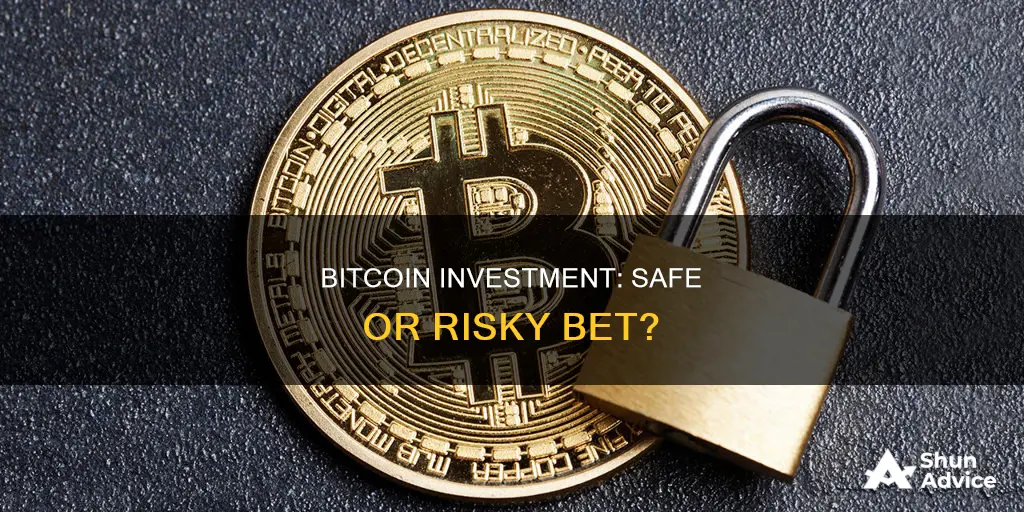
Investing in Bitcoin and other cryptocurrencies is risky. It's possible to get rich by investing in Bitcoin, but it's also very possible to lose all your money. Bitcoin is a particularly risky investment with more volatility than traditional investments in stocks, bonds, and funds. Aside from the price, you can also lose your Bitcoin through exchange crashes, losing wallet access, or falling victim to scams.
| Characteristics | Values |
|---|---|
| Volatility | High |
| Regulatory protections | Low |
| FDIC or SIPC insurance | No |
| Susceptible to market manipulation | Yes |
| Susceptible to scams | Yes |
| Susceptible to cyberattacks | Yes |
| Anonymity | No |
| Accessibility | High |
| Rate of return | Unproven |
| Legality | Varies by country |
What You'll Learn

Bitcoin's volatile nature
The actions of large-scale investors, or "whales", also play a significant role in Bitcoin's volatility. Their decisions to buy or sell substantial amounts can significantly impact supply and demand dynamics, leading to sharp price changes. Additionally, the cryptocurrency market infrastructure is still relatively immature, resulting in liquidity issues that can cause significant price changes as investors enter or exit positions.
Media coverage and regulatory news strongly influence Bitcoin's price as well. Positive media attention can increase investor interest and demand, while negative news or rumours of stringent regulations can lead to fear-induced sell-offs. Market sentiment, shaped by news coverage, investor commentary, and broader economic events, can trigger rapid shifts in investor behaviour, further intensifying Bitcoin's volatility.
The speculative nature of Bitcoin investments adds to the volatility. Investors often aim to capitalise on short-term price movements, and the prevalence of social media and real-time news can quickly spread rumours or unverified information, impacting market sentiment.
Lastly, the lack of regulatory frameworks specifically for cryptocurrencies contributes to the volatility. The absence of consistent and established regulations across different countries can make crypto markets more vulnerable to instability.
Overall, Bitcoin's volatile nature is a result of its nascent stage, market factors, investor behaviour, media influence, speculation, and regulatory uncertainties.
The Tax Implications of Bitcoin Investments
You may want to see also

Regulatory uncertainty
In 2021, China effectively made it illegal for citizens to mine or hold any cryptocurrency. If other countries follow suit, Bitcoin holders could be in hot water. The future regulatory environment for crypto is currently uncertain, and this uncertainty poses a risk to investors.
The regulatory landscape varies across the world. For example, Canada allows the usage of digital currency to buy goods and services online and in stores that accept it, but it is not considered legal tender. In India, the Bitcoin is not considered legal tender, and the conversion of Indian currency into cryptocurrency is illegal. The UK's Financial Conduct Authority has said it will work with the UK Treasury Committee to analyse the risks and opportunities related to cryptocurrencies and blockchain technologies.
The US Securities and Exchange Commission (SEC) has stated that the method used to raise equity in decentralised autonomous organisations (DAOs) is not a currency but a security. This means that DAOs are subject to federal securities law as they primarily profit from the efforts of others.
The lack of consistent regulation across the world has left many investors dazzled, dazed, and confused. However, some regulatory trends are emerging. In February 2019, the SEC issued guidelines on initial coin offerings (ICOs) in an attempt to formalise the sector. In January 2019, the EU released a set of guidelines for ICOs to help harmonise policies and regulations.
Despite these efforts, there is still much regulatory uncertainty. Debate continues regarding the categorisation of crypto assets as currency or securities. The inherent "trust" nature of the technology backing crypto-assets should not undermine the regulation guarding the industry. At the end of the day, the conversion of fiat currency to any asset is guarded by various securities laws. These laws protect investors and also help to prevent possible future economic ripple effects.
Bitcoin Investment: Is the Crypto Bandwagon Still Accessible?
You may want to see also

Security concerns
Bitcoin is a digital currency that uses blockchain technology to record transactions. While it is a relatively secure financial system, there are some security concerns that potential investors should be aware of. Here are some of the key security issues to consider:
- Blockchain Cybersecurity Risks: Blockchain uses hash functions to give each transaction a unique, unbreakable fingerprint, making it impossible to duplicate or infiltrate the blockchain. However, incorrect or fraudulent information in the chain cannot be overridden. If your private key, which grants access to your bitcoin wallet, is stolen, your cryptocurrency can be at risk.
- Bitcoin Wallet Security: Unsecure crypto wallets can be exploited by hackers, allowing them to divert funds to another account. Weak spots, intercepted communication between wallets and PCs, and other vulnerabilities put bitcoin funds at risk. It is crucial to keep your private keys secure and offline.
- Hackers and Cyberattacks: While the blockchain is challenging to attack, bitcoin exchanges and platforms can be hacked. These cyberattacks pose a significant security concern. It is recommended to use a combination of hot and cold storage for your crypto assets, with most held in cold storage.
- Selfish Mining: Powerful mining pools can mine a block and hide it instead of sharing it with the network. This practice can invalidate transactions and give an unfair advantage to selfish miners.
- Double-spending: Double-spending occurs when the blockchain network is altered to redirect cryptocurrency, allowing the sender to retain the funds instead of sending them to the receiver. Bitcoin has implemented safeguards to prevent this type of fraud.
- 51% Attacks: For the blockchain to be hacked, a mining pool would need to control 51% of bitcoin's mining capabilities. This level of control could be abused to invalidate blocks or engage in double-spending. While 51% attacks are a concern, they are highly unlikely to occur.
- Volatility: Bitcoin prices can be extremely volatile, and market risk is one of the biggest risks associated with investing in Bitcoin. Historical data shows that Bitcoin prices can fluctuate significantly, and investors need to be prepared for potential losses.
- Regulatory Uncertainty: The lack of a consistent regulatory framework for cryptocurrencies adds to the risk. Changes in government policies, such as China's ban on cryptocurrency in 2021, can significantly impact the value and legality of Bitcoin holdings.
- Cybersecurity: Your transactions and wallet information are only as secure as the passwords and security measures you have in place. It is essential to use strong passwords, two-factor authentication, and cold wallets to protect your Bitcoin investments.
- Scams and Fraud: Cryptocurrency scams and fraud are common, and investors need to be vigilant. Phishing emails, fake apps, and fake crypto wallets are some of the tactics used by scammers to gain access to private keys and steal crypto assets.
Schwab's Guide to Buying Bitcoin
You may want to see also

Scams and fraud
Common Cryptocurrency Scams:
- Investment schemes: Scammers pose as seasoned "investment managers" and request an upfront fee, promising high returns. They may also ask for personal information to gain access to your cryptocurrency.
- Fake celebrity endorsements: Scammers use real photos of celebrities and impose them on fake accounts, ads, or articles to promote a large financial gain from the investment.
- Rug pull scams: Scammers "pump up" a new project, NFT, or coin to attract funding. Once they receive the money, they disappear with it, leaving investors with a valueless investment.
- Romance scams: Scammers gain the trust of individuals on dating websites and shift conversations to lucrative cryptocurrency opportunities, eventually convincing them to transfer funds.
- Phishing scams: Scammers send emails with malicious links to fake websites to gather personal details such as wallet key information.
- Man-in-the-middle attacks: Scammers intercept sensitive information, such as passwords and wallet keys, when users log in to their cryptocurrency accounts on public networks.
- Social media giveaways: Fraudulent posts on social media promise bitcoin giveaways, but lead to fake sites that ask for verification and payment to receive the bitcoin.
- Ponzi schemes: New investors are lured in with promises of huge profits and little risk. However, there are no legitimate investments, and the scheme relies on targeting new investors for money.
- Fake cryptocurrency exchanges: Scammers lure investors with promises of great exchange rates and additional bitcoin, but the exchange is fake, and investors lose their deposits.
- Employment offers and fraudulent employees: Scammers impersonate recruiters or job seekers to gain access to cryptocurrency accounts or require cryptocurrency payments for job training.
- Flash loan attacks: Attackers borrow funds through flash loans and manipulate pricing on decentralised finance platforms to make a profit.
- AI chatbots and deepfakes: Attackers use AI to create realistic chatbots and deepfakes of celebrities to engage with users and promote fake tokens or endorsement schemes.
Red Flags and Protection:
To protect yourself from cryptocurrency scams:
- Be wary of promises of large gains or guaranteed returns.
- Be cautious if someone only accepts cryptocurrency as payment.
- Do not share your private cryptocurrency keys or access codes with anyone.
- Be suspicious of excessive marketing pushes, get-rich-quick claims, and poorly written white papers.
- Research the team members behind the cryptocurrency and scrutinise their marketing and advertising.
- Be cautious of "free" coins or offers to "drop" coins into your wallet.
- Never click on links, dial phone numbers, or send money to someone claiming to be from a government agency, company, or financial institution.
- Report scams to regulatory agencies, such as the Commodity Futures Trading Commission or the Federal Trade Commission.
- Be cautious of romantic interests on dating websites who try to convince you to invest in cryptocurrency.
- Be wary of "celebrities" or "investment managers" contacting you out of the blue.
How to Invest in Dogecoin: A Beginner's Guide
You may want to see also

The future of cryptocurrency
Firstly, cryptocurrency is becoming increasingly mainstream. What was once a fringe community of anti-establishment investors has now caught the attention of everyday consumers, businesses, and brands. The global cryptocurrency market is estimated to more than triple by 2030, reaching a valuation of nearly $5 billion. This growth has been accelerated by the pandemic, with consumers having more time on their hands and fewer activities to spend money on, leading to an explosion of interest in crypto trading.
Secondly, the institutional money pouring into cryptocurrency is changing the power structure of the market. Crypto mining, which used to be done by enthusiasts, is now dominated by a few companies that can provide the massive computing power and electricity required to mine at scale. This dynamic has cast doubt on the democratic nature of the market.
Thirdly, cryptocurrency is facing increasing regulatory scrutiny. While historically, governments have taken a relatively hands-off approach, the recent collapse of several crypto companies, including fraud charges against major exchanges, has prompted a more aggressive response from regulators. The U.S. Securities and Exchange Commission (SEC), for example, has filed lawsuits against Binance and Coinbase, the two largest cryptocurrency exchanges. The outcome of these lawsuits will have significant implications for the future of the industry.
Another factor to consider is the environmental impact of cryptocurrency. Crypto has a huge carbon footprint, which could become a growing source of concern for investors and regulators alike.
Finally, the mass-market adoption of cryptocurrency payments and the creation of exchange-traded funds (ETFs) based on digital currencies could further boost the legitimacy and accessibility of the market.
In conclusion, while the future of cryptocurrency is difficult to predict, it is clear that the industry is at an inflection point. The interplay between these various factors will shape the trajectory of cryptocurrency in the coming years, determining whether it becomes a lasting fixture of the global financial system or a passing fad.
The Beginner's Guide to Cryptocurrency and Altcoin Investing
You may want to see also







